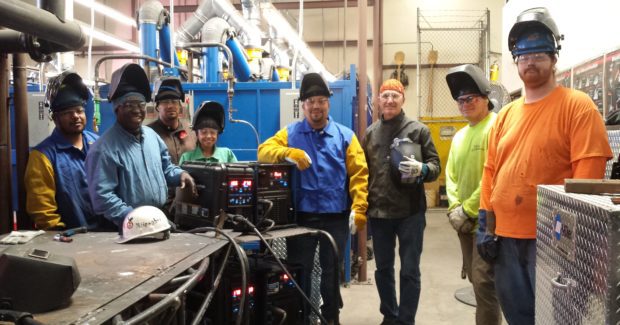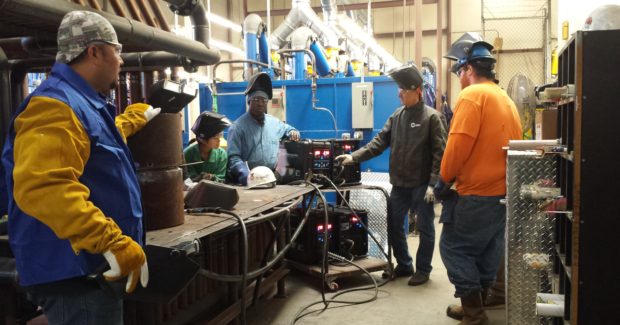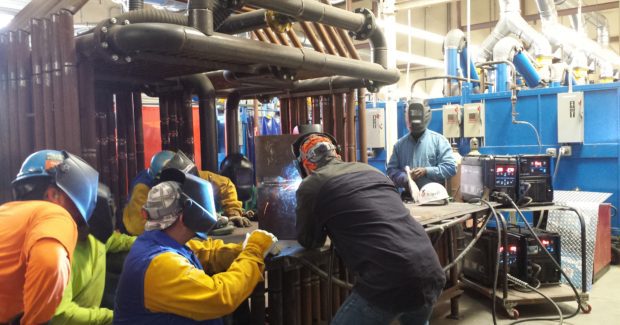Power Generation: Adapting to New Labor Demands in Power Plant Construction
Boilermakers Local 92 is now experiencing significant growth in labor demand after adapting to changes caused in part by a recently enacted state law to meet power plant demands that impacted their refinery jobs.
Posted: October 10, 2016
Boilermakers Local 92 (Bloomington, CA) is experiencing significant growth in labor demand, caused in part by a recently enacted state law that impacts refinery jobs. The law requires that 60 percent of the skilled workers employed by contractors at refineries and chemical manufacturing facilities be graduates of state-approved apprenticeship programs. This increase in demand for California building trades workers on refinery jobs – coupled with the industry-wide shortage of skilled welding operators and a boom in power plant construction projects in southern California – had Local 92 leaders searching for solutions to help them put trained members to work faster on projects in the region to meet the needs of their contractor partners.
Contractors win bids for work and then rely on labor from local union halls to complete projects for the customers, which are typically the oil company or utility that owns the facility. Some contractors are investing in new technologies and equipment and implementing advanced welding processes to help them stay ahead of the competition and thrive in the face of industry challenges and trends. Local 92 saw the improved productivity and efficiency these contractors achieved and decided to undergo a similar switch to new welding technologies and advanced wire processes for its apprenticeship and member training programs.
The addition of equipment with new technologies and capabilities allows Local 92 to train members in cutting-edge advanced wire welding processes that are also easy to learn and use. This, in turn, helps the union meet the increasing demand for skilled workers on a wider variety of jobsites in southern California and southern Nevada. And according to Local 92 president Oscar Davila, the new capabilities have given them the ability to put more of their members to work faster and on more jobsites.
GROWTH IN TRAINING NEEDS
Local 92 is about 1,000 members strong and offers the standard national boilermaker apprenticeship program that typically trains up to 40 members at a time for the union hall. The four-year, 6,000 hour apprenticeship program covers a range of welding processes, materials and certifications. Areas covered include MIG, TIG, flux-cored and stick welding on carbon and stainless steel; rigging; cutting; safety; and pipe-specific training. To become a journeyman, an apprentice must also complete 48 self-study lessons, 21 on-the-job training modules and a minimum of 144 hours per year of classroom instruction. The union serves a number of industries, including oil refineries, shipbuilding, and coal, natural gas and nuclear power plants. Local 92 focuses on quality, safety and meeting critical deadlines, with the aim of filling the needs of contractors and their customers in the most cost-effective way.
One major contractor in the Local 92 region recently converted to advanced wire processes for welding in the field – including Regulated Metal Deposition (RMD®) – and reaped significant productivity benefits that help meet or beat critical project schedules. RMD, a modified short-circuit MIG process, provides much faster travel speeds and eliminates back purge on some alloys, saving time and money for the contractor while allowing operators to produce consistent high-quality welds. Those were eye-opening benefits for Local 92 union leaders. “We want to remain at the forefront of the welding technology being used by contractors so that our members are best prepared for where the industry is heading,” said Davila. “Training in new technologies and processes helps increase the demand for our labor pool. It also utilizes the welding skills that our members already have, while training them in a different way to be more successful with the advanced welding technology.”
CONVERSION TO MORE PRODUCTIVE PROCESSES
To help satisfy the growing demand for skilled workers and to stay in front of changing technology, Local 92 began using the PipeWorx 350 FieldPro™ system for skilled labor training programs. Members train on the FieldPro to gain certification in pulsed MIG and RMD welding processes. They are required to pass a 6G TIG root pass heavy wall tube test before they can begin training on the PipeWorx system. “While a few of our members were reluctant to change from their traditional welding processes and the way things were previously done, the ease-of-use of these machines and the high quality welds they can achieve with the advanced processes quickly won them over,” noted Davila.
With a modified short-circuit MIG process such as RMD, the welding system anticipates and controls the short circuit, then reduces the welding current to create a consistent metal transfer. Precisely controlled metal transfer provides uniform droplet deposition, making it easier for the welding operator to control the puddle. Advanced welding processes such as pulsed MIG or RMD also are more forgiving to variations in stickout and result in a calm, stable arc, which is easier for operators to control. These processes also provide increased productivity and efficiency by way of travel speeds that are three to four times those of TIG or stick welding. On some alloys, the advanced wire weld procedures allow for no back purge, resulting in saved operator time and material costs and improved productivity.
Where previously the root pass on P91 pipe was TIG welded and required a back purge, Local 92 is now training members to use RMD for the root pass without a purge, followed by solid wire pulsed MIG for the remaining passes. “This saves tremendous time and consumable costs,” added Davila. “Technologies and processes that make it easier for skilled welders to become trained and make it easier to complete quality work in less time on the jobsite are important for the industry as it faces the growing welding operator shortage.”
COMPLETING JOBS IN HALF THE TIME
Local 92 has seen numerous benefits from the conversion to advanced wire processes. One significant benefit is the ability to complete welds much faster. “Using RMD and pulsed MIG processes, welding operators can complete welds in about half the time compared to using stick or TIG, without sacrificing weld quality,” explained Davila. “A project that previously took three days can now be done in one and a half.” Along with the increased productivity and time savings, the switch in processes also saves money in materials and consumables. “Eliminating the back purge on the root pass saves in gas and the cost of the pumping systems needed to distribute the gas on jobsites. That’s a benefit for contractors as well as the union, since we realize material savings during the training process,” added Davila.
In addition to the capability for advanced wire processes, the FieldPro systems offer remote control welding technology. The ability to make process changes and parameter selections at the weld joint with no special cables helps significantly minimize downtime that welding operators spend traveling back and forth to the power source. This means more arc-on time, which helps welding operators complete more welds and achieve higher overall productivity.
Remote control technologies also offer benefits for welding operator safety, since reducing the number of trips back and forth to the power source helps reduce trip and fall hazards. This can especially make a difference on expansive jobsites. “Jobsites are often so large that welding operators may be working 400 ft in the air,” said Davila, who is also the local OSHA instructor. “Boilers, dams, power plants, storage tanks and pressure vessels are usually of massive size, so a major portion of boilermaker work is performed at great heights.” When welding operators have the ability to easily control welding parameters at the weld joint – saving them from repeatedly climbing up and down stairs or towers and navigating a crowded jobsite – it offers major benefits for safety and productivity. It also eliminates the need to make do with less-than-optimal parameters.
DEMAND FOR LOCAL 92 MEMBERS
“The ability to quickly train our members in more welding processes has placed Local 92 workers in demand,” stated Davila. “This allows more of our members to be utilized on different jobsites and helps prevent downtime for the workers in between projects.” Often the union membership is 100 percent employed on jobsite projects, with Local 92 leaders looking for more skilled workers to train so they can fill contractor needs. “As more contractors realize the benefits of these advanced welding processes, this demand will likely continue to grow,” added Davila. “We plan to continue to invest in this technology and add more FieldPro machines to expand the training opportunities in advanced wire processes.”
New welding technologies and a switch to welding processes that are easier to learn and use are helping Local 92 train more skilled workers to meet growing contractor and customer needs. The conversion also boosts productivity without sacrificing weld quality and helps contractors ensure that they can fulfill projects on time and on budget.


















